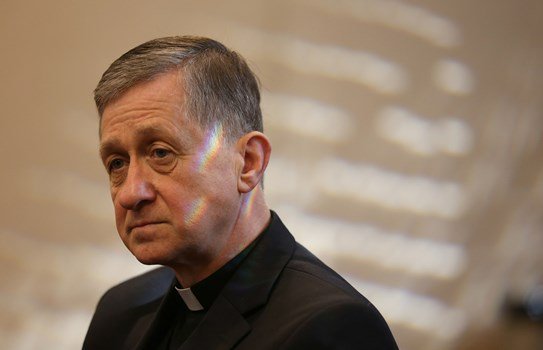Newly minted Chicago Archbishop Blase Cupich recently said the following on the question of the administration of Communion to public officials who support abortion:
I would not use the Eucharist or as they call it the communion rail as the place to have those discussions or way in which people would be either excluded from the life of the church. The Eucharist is an opportunity of grace and conversion. It’s also a time of forgiveness of sins. So my hope would be that that grace would be instrumental in bringing people to the truth.
It’s a powerful statement from a high-ranking official, and it prompts some honest reflections and sincere questions.
– “excluded from the life of the Church”. How does one’s exclusion come about? What does that even mean? In this case, we’re talking about individuals who have taken a conspicuous stance against one of the most fundamental teachings of the Church (and of course natural law). Haven’t they freely opted to exclude themselves from full communion by their own choice? Isn’t it more accurate to say that one excludes himself from “the life of the church”?
– “It’s also a time of forgiveness of sins.” True for venial sins, not mortal ones. In words far more eloquent than anything I can piece together, then-Cardinal Joseph Ratzinger once observed,
The Eucharist is not itself the sacrament of reconciliation, but in fact it presupposes that sacrament. It is the sacrament of the reconciled, to which the Lord invites all those who have come with him; who certainly still remain weak sinners, but yet have given their hand to him and have become part of his family. That is why, from the beginning, the Eucharist has been preceded by a discernment. We have just heard this, in very dramatic form, from Paul: “Whoever eats unworthily, eats and drinks judgement on himself, because he does not distinguish the Body of the Lord” (1 Cor 11:27). The Teaching of the Twelve Apostles, one of the oldest writings outside the New Testament, from the beginning of the second century, takes up this apostolic tradition and has the priest, just before distributing the Sacrament, saying: “Whoever is holy, let him approach–whoever is not, let him do penance!”
– “So my hope would be that that grace would be instrumental in bringing people to the truth.” Sounds eloquent enough. But does grace operate through a willful act of sacrilege? “Hope” is great and all, but if that’s all there is to it then why call it a “sacrilege” in the first place? Saint Paul was quite clear and, as an Apostle, set the bar for the entire history of Church teaching on the question. What then is the point of Canon 915, which states in the plainest of terms that, “Those who have been excommunicated or interdicted after the imposition or declaration of the penalty and others obstinately persevering in manifest grave sin are not to be admitted to holy communion.” If we can turn a blind eye to a grave sacrilege and scandal by saying, “Well, I hope some good comes from it, eventually,” then why have the rule to begin with? Why have Can. 915 at all, if we can just wash our hands of the messy business and say, in effect, “God, you figure it out.”
Also, what exactly is compassionate and pastoral about allowing someone under your care to commit a sacrilege by “failing to distinguish the Body of the Lord”?



